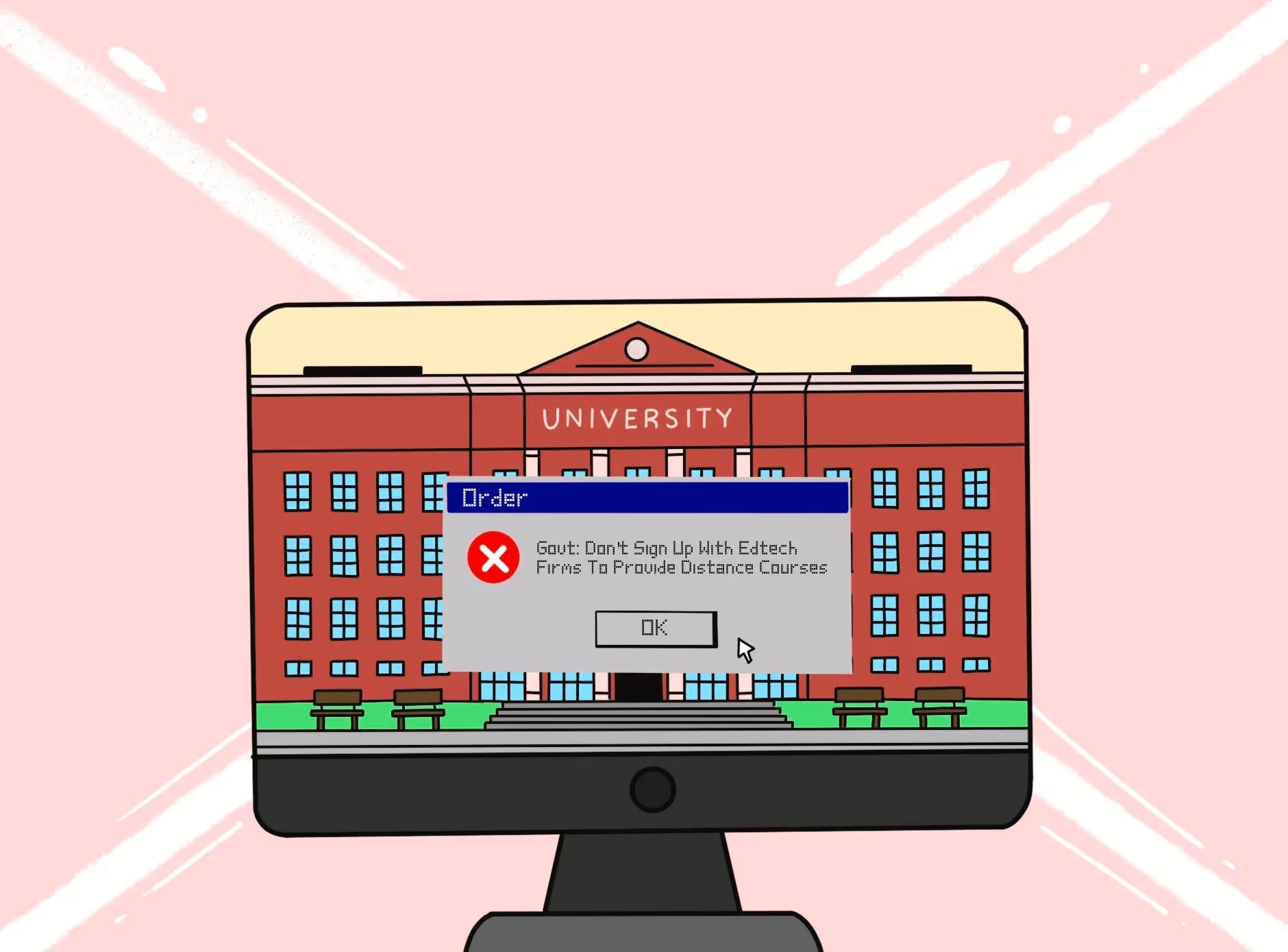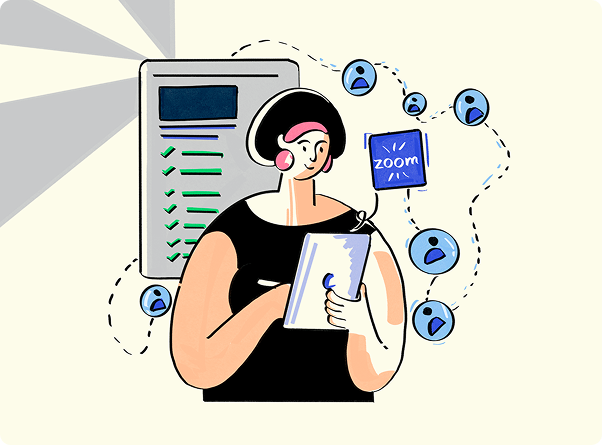




Key Takeaways
Education in India is seeing a revolution, with the government and private players coming up with innovative and disruptive ideas to reach out to as many students as possible. The latest similar initiative is by the HRD ministry, which has sent letters warning educational institutes against tying up with EdTech firms that offer 'distance education' courses.
Govt. has cautioned institutes against tie-ups with private companies for running distance education courses. The move comes after the regulator found that some such courses were not being conducted in accordance with the rules and regulations set by it. The government has raised several concerns over the tie-ups between institutes and EdTech firms to control the proliferation of distance education and check malpractices. The ministry of human resource development (MHRD) has warned all state universities, including northeastern states, not to tie up with any private or foreign education technology (EdTech) enterprise for offering distance education even before checking the track record of such firms.
In schools with offline distance learning programmes, private education providers like EdTech firms are playing a school-in-school model to provide content for specific classes. According to a recent circular by the technical education ministry, this makes institutes ineligible for grants from the government and amounts to cheating. In the wake of leading global education services provider Pearson, creating doubts about Distance Education Council of India (DEC) 's recent guidelines to regulate foreign players in the distance education sector, union HRD minister Smriti Irani recently issued a statement urging colleges and universities not to tie up with such companies to offer any programme. Earlier this year, the University Grants Commission (UGC) came out to ban local universities and colleges from tying up with entrepreneurial ventures for offering online degrees and certificates. In a move that will be welcomed by hundreds of thousands of students across the country, private education providers can now only work with central (or state) government authorities for offering distance learning programmes.
The order comes a week after five top EdTech companies — Byju's, Unacademy, upGrad, Gradeup and Vedantu — announced that they had created a self-regulatory code for the sector. The Indian EdTech industry is expected to be worth $3.5 billion by the end of 2022, and the UGC and AICTE have been concerned about quality control and transparency in the sector.
In the order, the regulators said that educational institutions are not allowed to partner with EdTech firms to offer online or hybrid programmes without their prior approval. They also warned that any institute flouting this rule would face being derecognized by UGC and AICTE. The order also said that no institute could offer such programmes without accreditation from the National Assessment and Accreditation Council (NAAC) or the National Board of Accreditation (NBA).
Driving the story:
The two bodies warned against arrangements that may "compromise with the quality of education" and said such moves are not permissible under the law. The notice, which was addressed to higher education secretaries, universities and other institutions, said that EdTech companies offering degree and diploma programmes in online or open and distance learning (ODL) modes in association with universities have been reported.
It is said that these EdTech companies are using such "franchise" arrangements to offer full-time and part-time courses through the ODL mode. Such a franchise arrangement is not permissible, and action will be taken against defaulting EdTech companies and higher education institutes (HEIs) under applicable laws/rules, it added.
It further stated that the UGC had, on December 8, 2017, also notified guidelines for ODL programmes offered in collaboration with foreign/international institutions. Still, such guidelines do not permit any such franchise arrangement.
"Any franchise certificate/authorization provided by a university/institution to any EdTech company is illegal. HEIs must ensure that they do not indulge in any such activity which may compromise with the quality of education," said the notice.
The notice also cautioned students against getting into such arrangements and said they must check the recognition/entitlement status of a programme before enrolling in it.
"Some EdTech companies are giving advertisements in newspapers/social media/TV, etc., that they are offering degree and diploma programmes in ODL/online modes in association with some universities/institutions. Such a franchise arrangement is not permissible, and action will be taken against defaulting EdTech companies as well as HEIs under applicable laws/rules," said the notice.
What's the problem?
A senior official said some universities were outsourcing content creation to EdTech firms, and some EdTech firms were awarding degrees. "Some universities and institutes are running programmes through EdTech companies. Using a particular platform or a learning management system is one thing, but many higher education institutes in India are outsourcing the running of their online courses to EdTech firms. That kind of outsourcing or franchising is not permitted," said an officer from AICTE.
A UGC officer said, "We don't want EdTech players advertising that they are offering MBA or BMS. They do not have permission to do so.
How do we keep a check on the quality?"
In the past few days, at least three EdTech companies - Simplilearn, Imarticus Learning, and upGrad - have revised their online courses to remove mention of degrees or diplomas in their course titles. For example, Simplilearn's Postgraduate Programme in Digital Marketing and Communication (PGPDMC) has now been renamed Post Graduate Certificate in Digital Marketing and Communication.
It is essentially the same course but without the degree tag.
The UGC guidelines say a university can offer a programme through digital mode if regularly provided by them. "The UGC had clarified that it was okay for third-party service providers to provide technical support to universities," said a senior official from AICTE.
The National Education Policy 2020 has given the go-ahead to online education, especially in challenging times when students find it difficult to travel or attend classes physically due to the pandemic. It says that educational institutions will be encouraged "to take advantage of technology-enabled flexible learning and open educational resources" while also calling for "the introduction and expansion of alternative modes of higher education, such as online and distance learning and twinning arrangements". Is this OK? Students from the remotest parts of the country can now avail themselves of education without leaving their homes. This is a welcome move in a country like India, where many students have to travel long distances to get an education. But will this approach work for everyone?
But the regulatory agencies are concerned about EdTech firms offering degrees without having permission from the UGC or AICTE to do so." Some universities and institutes are running programmes through EdTech companies. Using a particular platform or a learning management system (LMS) is not an issue. Still, some of these companies are giving away degrees, which is problematic," said HRD Minister Ramesh Pokhriyal. Besides being a degree-granting body, an institute must have the infrastructure for research. There are specific standards for education that need to be met by institutes and universities. "There are degrees that require hands-on learning, such as engineering. Will online courses be able to do that? And what about exams? Online proctored exams have their problems," said a senior official at AICTE.
The regulator also has to ensure that there is quality control in place. "For instance, if an institute offers an online course and another institute offers it as a full-fledged degree programme with practicals, then how will we ensure parity?" the official asked. The UGC and AICTE had also recently sent notices to institutes running programmes through EdTech platforms such as Coursera and Udacity - including Indian Institutes of Technology (IITs) and Indian School of Business (ISB) - asking them to stop the partnerships.
- The use of technology in education has been on the rise. In 2017, EdTech investments in India surpassed half a billion dollars. But there have been allegations that some of these firms are not getting all their necessary approvals before offering their programmes.
- "The companies need to seek approval from UGC as well as AICTE before launching such programmes. If they don't have this approval, we take action against them," says Jain.
- "UGC has clearly stated that online courses offered by any private entity do not come under its purview unless it's a full-fledged distance learning programme recognized by UGC. Only such online courses offered by institutions recognized by AICTE or UGC are allowed," says an official at the University Grants Commission (UGC).
- The education regulator has started consultations with stakeholders, including the All India Council for Technical Education (AICTE), to frame rules for granting credit for courses offered by Massive Open Online Course (MOOC) platforms such as Coursera and EdX. "We have started discussions with stakeholders. We are trying to figure out the right way of doing it," said a University Grants Commission (UGC) official who did not want to be named.
The idea is to give credits to learners who complete courses on MOOCs to use those credits while pursuing higher studies. "You must understand that this is very different from normal distance learning programmes where a learner is registered with an institute," said another UGC official. I have covered this more in detail on my blog called Academic Bank of Credits (ABC): What is it?
Self-regulatory Code
We reported last week that top EdTech firms such as Byju's, Unacademy, upGrad, and others were joining forces to develop a code of conduct for how they do business. They seek to address two core issues: misleading advertisements and unscrupulous business practices.
Several industry insiders suggest that the move could be linked to the Competition Commission of India (CCI) looking into allegations of predatory pricing within the sector. The CCI noted that "the information prima facie suggests a nexus between the dominant EdTech players in India which requires detailed investigation". It remains to be seen whether this will have a larger impact on the market, and even if it does, it would be only a temporary fix. More than anything, it reflects some early attempts at self-regulation by an industry that has grown rapidly but has also been marked by a series of controversies and opaque practices.
The government has also been wary of the mushrooming of 'digital' universities. In 2019, it rejected an application by Karnataka to set up a digital university funded by US-based online learning platform Coursera.
In 2018, Karnataka applied for permission to convert Swami Vivekananda Yoga Anusandhana Samsthana (S-VYASA), a university in Bengaluru, into a digital university called S-VYASA Digital University that would offer degree courses through online teaching. The UGC rejected the proposal because it was not in line with the National Education Policy, which stresses the need for physical interaction between students and teachers.
Lastly, Government Caution:
The move came after the education ministry issued an advisory about EdTech platforms in late December. It said the department of school education and literacy had received several complaints and advised parents to deactivate the auto-debit option for subscriptions in 'freemium' models. Some firms targeted families by getting the electronic fund transfer (EFT) mandate signed or activating the auto-debit feature.
"Given the pervasive impact of technology in education, many EdTech companies have started offering courses, tutorials, coaching for competitive exams, etc., in an online mode. In this background, the parents, students and all stakeholders in school education have to be careful while deciding on opting for online content and coaching being offered by a host of EdTech companies," the ministry said.
The CCI noted that complaints from parents regarding violation of regulatory provisions show that such agreements are "nudges" that either require explicit action from users to opt-out or are presented in a bundled form and require direct effort from users to deselect modules not needed. "Thus, merely providing information about the existence of such nudges does not change user behaviour as users often do not bother to read disclosures or do not understand complex disclosures," it said.
Conclusion
Given the number of untrained or inadequately trained self-employed tutors that offer e-learning, the government must be careful in vetting any firm chosen to provide distance learning courses.
The government will recommend that instruction on e-learning be conducted through a central online learning platform, which could work much like Railways' virtual classroom and JEE availability portal. This will avoid any chance of students being duped by online operators.
The need of the hour is to regulate the education business to ensure quality and prevent possible malpractices in the name of education. This can be done by framing policy and monitoring through an institutional mechanism. Another suggestion is to build healthy competition among players in the sector so that no one will be complacent and can improve further. As for students, watch out for their interests and do not get trapped for monetary gains.Several issues need to be resolved before EdTech firms can provide distance education to students of the top institutions in the country. For this purpose, multiple amendments need to be made to both central and state laws. And if things proceed at their current pace, if at all, it would take years for the government to get its act together.
We hope that the government will view these guidelines as a set of broad principles they should keep in mind while framing their policies concerning HTs' partnerships with EdTech companies and ensuring that students are not subject to exploitation by EdTech companies.
Recommended Reads
Recommended Reads








.png)
.webp)
